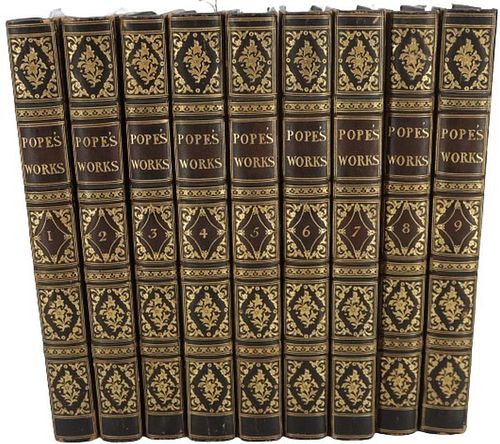This nine-volume set is titled "The Works Of Alexander Pope, With Notes And Illustrations By Joseph Warton, D.D., And Others, A New Edition, Complete In Nine Volumes." The series was printed in London by J. F. Dove at St. John's Square for Richard Priestley, High Holborn, in MDCCCXXII [1822].
The books have four raised bands, with gilt titles and elaborate gilt tooling on the spines, double gilt-fillet borders on the covers and marbled endpapers, with Arabic numbers on the spines and Roman numerals on the title pages, and all the edges are marbled.
Alexander Pope (1688 - 1744) was an English poet, translator, and satirist of the Enlightenment era who is considered one of the most prominent English poets of the early 18th century. An exponent of Augustan literature, Pope is best known for his satirical and discursive poetry including The Rape of the Lock, The Dunciad, and An Essay on Criticism, and for his translations of Homer. Pope is often cited in The Oxford Dictionary of Quotations, with some of his verses having entered common parlance (e.g. "damning with faint praise" or "to err is human; to forgive, divine").
His parents were Catholic, and Pope's education was affected by the Test Acts, a series of English laws that upheld the status of the Church of England, banned Catholics from teaching, attending a university, voting, and holding public office on penalty of perpetual imprisonment. Pope was taught to read by his aunt and attended Twyford School circa 1698, and he attended two Roman Catholic schools in London; such schools, though illegal, were still tolerated in some areas.
In 1700, his family moved to a small estate in Binfield, Berkshire; this was due to strong anti-Catholic sentiment and a statute preventing "Papists" from living within 10 miles of London or Westminster. Pope's formal education ended at this time, and from then on, he educated himself mostly by reading the works of classical writers such as Horace and Juvenal, the epic poets Homer and Virgil, as well as English authors such as Chaucer, Shakespeare, and John Dryden. He studied many languages, reading works in French, Italian, Latin, and Greek, and after five years of study, Pope came into contact with figures from London literary society who further stimulated his growth.
From the age of 12 he suffered numerous health problems, including Pott disease, a form of tuberculosis that affects the spine; it deformed his body and stunted his growth, leaving him with a severe hunchback. His tuberculosis infection caused other health problems, and he grew to a height of only 4 feet 6 inches. Pope was already removed from society as a Catholic, and his poor health alienated him further.
In May 1709, Pope's Pastorals was published in part of bookseller Jacob Tonson's Poetical Miscellanies. This earned Pope instant fame, and other poetry followed. He made friends with Tory writers Jonathan Swift, Thomas Parnell and John Arbuthnot, who formed the satirical Scriblerus Club with him. Its aim was to satirize ignorance and pedantry - excessive concern with minor details and rules - through the fictional scholar Martinus Scriblerus.
In 1714 the political situation worsened with the death of Queen Anne and the disputed succession between the Hanoverians and the Jacobites, which pitted Irish vs. Scottish forces and lead to the Jacobite uprising of 1715. Some of his friends fled to France.
Around this time, Pope began his work of translating the Iliad, which was a painstaking process - publication began in 1715 and did not end until 1720.
So except for a few spurious Catholic schools, Pope was largely self-educated. He was taught to read by his aunt and became a book lover, reading in several languages and discovering Homer at the age of six, and his works became ever popular. He also had a strong influence on Lord Byron, and in the 20th century, people recognized that Pope's immersion in a Christian and Biblical background lent depth to his poetry.
Volume I has the bookplate of Lord Gwydyr, who represented the English peerage from Wales in the 1700's and 1800's, a frontis portrait of Alexander Pope, a two-page Advertisement from Joseph Warton, then one page of Contents, a full-length portrait of Pope, which is evidently very rare, and 399 pages of text. Volume II has four pages of Contents (ii - vi) and 383 pages of text, the third volume has one page of Contents, a one-page Appendix after page 301 and then the text resumes - very odd sequencing - and 351 pages of text altogether. Volume IV has one page of Contents and 436 pages of text, the fifth volume has one page of Contents, a Preface to the Appendix, 294 pages of text, then an Appendix that runs from 295 to page 325, followed by a three page Index and The Dunciad that runs from 331 to 374. Volume VI has two pages of Contents, 395 pages of text, and the chapters about Martinus Scriblerus, Volume VII
has six pages of Contents and 375 pages of text, the next volume has fourteen pages
of Contents (a2 - xii) and 383 pages of text, and the last volume has ten pages of Contents and 479 pages of text.
The books are 8vo. and measure 8 3/4 x 5 1/2 in. wide, and are in very good condition. The bindings are tight, with no loose pages, the pages and text are rather clean, and all the pages are here, with scattered brown spots in the margins and near the endpapers, a few tips turned in, and light offset on some of the frontispieces, light rubbing along the edges and light abrasions or rubbing on some of the covers. The other sets we've seen have chips, wear, missing pages, and repairs, and this set is in much better condition than those. Overall, a healthy, sturdy set of books by one of England's 's greatest poets and authors.
#43 #5002
Available payment options
We accept all major credit cards, wire transfers, money orders, checks and PayPal. Please give us a call at (941) 359-8700 or email us at SarasotaEstateAuction@gmail.com should you have any questions about payment.




















